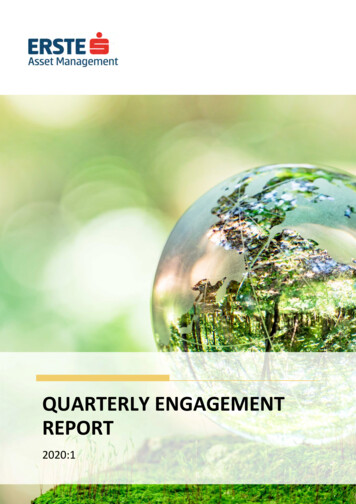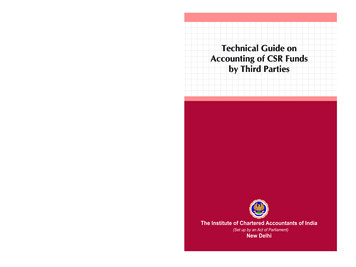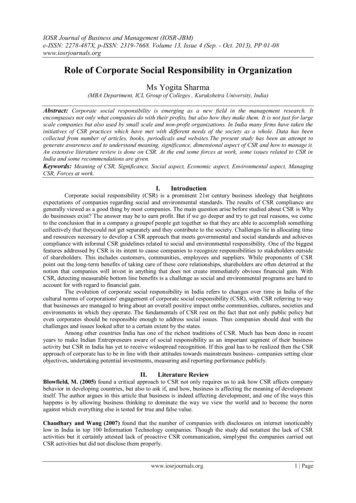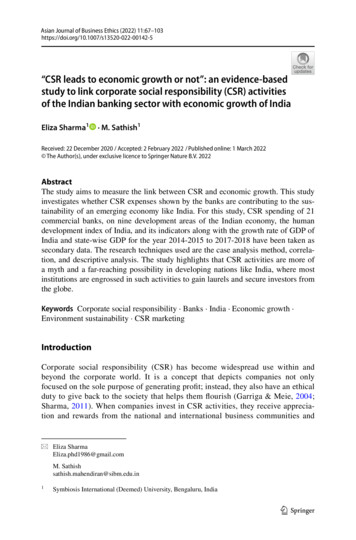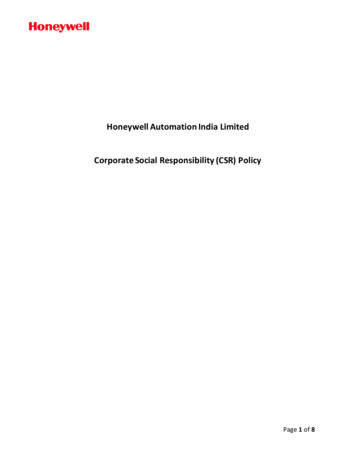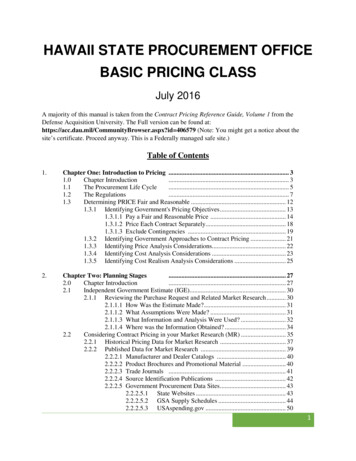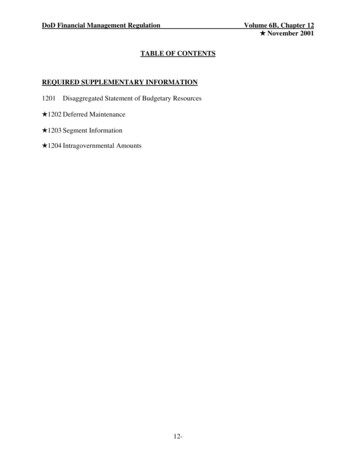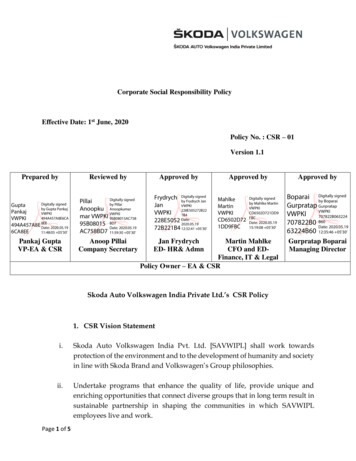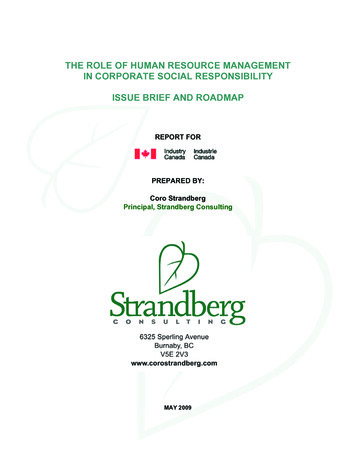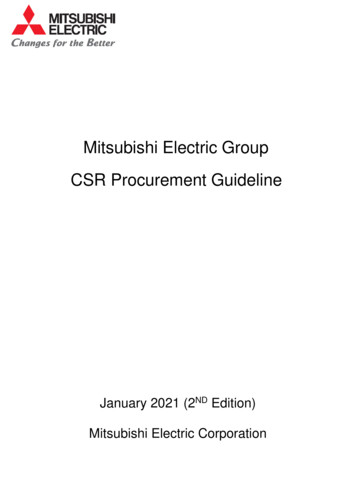
Transcription
Mitsubishi Electric GroupCSR Procurement GuidelineJanuary 2021 (2ND Edition)Mitsubishi Electric Corporation
ContentsIntroduction ��・・・・・・・・・・・・ 1Ⅰ.Objective and Scope of the �・・・・・・・ 2Ⅱ.Requests to Suppliers �� 21. Understanding and respecting the Group’s Purchasing Policy and the CSR ProcurementPolicy2. Understanding priority risks management and implementing CSR evaluation3. Confirming agreement to this GuidelineⅢ.Detailed Explanation of Core Principles �・・・51. Human Rights and Labor2. Health and Safety3. Fairness and Ethics4. Product Quality and Safety5. Information Security6. Management Systems7.Social ContributionⅣ.Environmental Initiatives �.Responding to the “CSR Initiative Survey (Question III.)”・・・・13Ⅵ.Contact ��・・・・・・・・・・・・13History of revision ��・・・・・・・14CSR Procurement Guideline Consent Confirmation Form・・・・・・・15
IntroductionThe Mitsubishi Electric Group positions CSR initiatives as the basis of corporate management. Wepromote the "Corporate Mission" and the " Our Values “as our basic policy for CSR. With regard toefforts relating to ethics and legal compliance in particular, we are taking thorough measures such as toenhance the quality of education and strengthen internal control. In addition, we are actively developinginitiatives for ensuring and improving product quality as well as activities for environmentalpreservation, social contribution and communication with stakeholders.1. PurposeWe, the Mitsubishi Electric Group, will contribute to the realization of a vibrant andsustainable society through continuous technological innovation and ceaselesscreativity.2. Our ValuesTrustWe develop relationships based on strong mutual trust with all stakeholders including society,customers, shareholders, suppliers, and employees working together.QualityWe ensure the satisfaction of society and customers by providing products and services of the bestquality.TechnologyWe provide society with new value by enhancing technology and onsite capabilities.Ethics and CompliancesWe act with high ethical standards and comply with laws and social norms.HumanityWe prioritize health and safety, promote diversity, and respect personalities and human rights.EnvironmentWe strive to protect and improve the global environment, doing so in harmony with nature.SocietyWe contribute to the development of a better society as a corporate citizen.3. CommitmentChanges for the Better"Changes for the Better" represents the Mitsubishi Electric Group’s attitude to “always strive toachieve something better”, as we continue to change and grow. Each one of us shares a strongwill and passion to continuously aim for change, reinforcing our commitment to creating “an evenbetter tomorrow”.With the progress of globalization, we are required to fulfill our social responsibilities not only of ourown company but also of our supply chain in promoting CSR activities. Under such social demands, wehave for some time requested our suppliers to understand and proactively promote CSR activities basedon Purchasing Policy and CSR Procurement Policy of the Mitsubishi Electric Group.Under such circumstances, the Mitsubishi Electric Group has created the "Mitsubishi Electric GroupCSR Procurement Guideline" to further promote CSR with our suppliers. We kindly request youragreement with the items stipulated in this Guideline as well as to continue proactively promoting CSRactivities.1
Ⅰ.Objective and Scope of the GuidelineThe Mitsubishi Electric Group aims to become a "global environmentally advanced company" thatcontributes to the realization of a prosperous society that is compatible with sustainability, security, safety,and comfort, by pursuing sustainable growth throughout the group and enhancing corporate value. Inorder for an organization to fulfill its social responsibilities such as respect for human rights, considerationfor safety and health, and compliance with laws and regulations, not only in-house but also in the supplychain, appropriate measures including promotion of "CSR Procurement" must be addressed. TheMitsubishi Electric Group regularly investigates and evaluates our suppliers' CSR efforts and requestscorrective measures for items with a low evaluation. We would like to ask our suppliers for their supportand cooperation as we aim to further promote our activities in partnership with our suppliers.As we aim to encourage our suppliers to further promote and strengthen corporate CSR activities, wehave based this Guideline on the RBA Code of Conduct (Version 6.0) formulated and announced byResponsible Business Alliance (RBA) and Responsible Business Conduct Guidelines issued by thematerial committee of Japan Electronics Information Technology Industries Association (JEITA).The items relating to human rights in this Guideline are based on international human rights standardsincluding the "ILO Declaration of Basic Principles and Rights in Labor" and the "Universal Declarationof Human Rights" which are both in accordance with the "Guidelines on Business and Human RightsPrinciples" and "Sustainable Development Goals (SDGs)" adopted by the United Nations. We ask oursuppliers including their business partners for their understanding and support for the items in thisGuideline. In accordance with the spirit of the Mitsubishi Electric Group's "Corporate Mission " and "OurValues," the Mitsubishi Electric Group's human rights policy was established in September 2017, andour business activities have a negative impact on human rights.We will increase our sensitivity tohuman rights and take appropriate measures to prevent such problems.Please understand that the Guideline will be reviewed and revised according to the demands of theinternational community and will undergo changes according to the times.2
Ⅱ.Requests to Suppliers1.Understanding and respecting the Group’s Purchasing Policy and theCSR Procurement Policy・ Basic policy of the Mitsubishi Electric Group is to prioritize procurement from suppliers with acomprehensively high evaluation during supplier selection and evaluation. With the progress ofglobalization, the supply chain of the Mitsubishi Electric Group has expanded to various countries andwe recognize that our supply chain may have issues concerning aspects such as labor laws andenvironment. In order to promote initiatives aimed at reducing risks in these areas, we ask our suppliersto understand Purchasing Policy and CSR Procurement Policy of the Group as well as to share thisinformation within their supply chain.【Purchasing Policy】Mitsubishi Electric Group purchases materials based on the following three basic policies.1. Easy Access and Equal OpportunityTo guarantee our customers the highest-quality products, we are constantly searching for newsuppliers. We encourage business partners from all over the world, regardless of size, to contactus about submitting a quotation. The decision to embark on a new business relationship is madeafter careful consideration of three major factors: product price, product quality, and deliveryperformance. To ensure continued high quality and efficiency, we periodically review ourrelationships with our partners.2. Mutual ProsperityWe believe in long-term relationships built upon understanding and trust. This will allow theparticipation of our business partners during the product development stage, paving the way formutual prosperity.3. Ecological SoundnessWe are interested in the materials and manufacturing processes used by our suppliers. Becausewe value the environment, we buy only ecologically sound products. Our mission is to satisfy theneeds of people around the globe. To meet their growing expectations, we must widen andstrengthen our affiliations with companies all over the world. We are seeking cooperation, not justbusiness, and are looking for potential partners who are willing to join us in our drive toward globalprosperity.【CSR Procurement Policy】1.Compliance with domestic and foreign laws/regulations and social standards(1)Ensuring compliance with laws and regulations(2)Respecting human rights and prohibiting discrimination, child labor, and forced labor(3)Creating proper work environments and giving consideration to safety and health2.Assurance of quality and safety of products and services3. Environmental considerations(1)Procuring materials with less negative impact on the environment(2)Ensuring strict management of harmful chemical substances based on an environmentalmanagement system4.Promotion of fair trade based on corporate ethics(1)Practicing honest trade on fair and equal footing, based on laws/regulations and agreements(2)Ensuring strict management and safeguarding of information by establishing an information securitysystem(3)Thorough elimination of fraudulence, bribery, and other such conduct that violates corporate ethics3
【Responsible Minerals Procurement】The Mitsubishi Electric Group aims for transparency in its supply chain to avoid any affiliation witharmed groups that trade in conflict minerals*1 as their source of funding. We also recognize thepossibilities of human rights violations occurring in the severe labor conditions in cobalt mining sites asa major problem. The Group adheres to the OECD Due Diligence Guidance for Responsible SupplyChains of Minerals from Conflict-Affected and High-Risk Areas, and removes certain minerals from thesupply chain in situations where their procurement encourages or contributes to serious human rightsviolations or environmental destruction.*1 Conflict minerals refers to gold, tin, tantalum, tungsten, and other minerals that have beendetermined by the U.S. State Department to be a source of support for armed groups when mined inthe countries referred to above.2.Understanding priority risks management and implementing CSRevaluationThe Mitsubishi Electric Group has set priority issues in the supply chain as follows.Environmental priority issues are outlined in the Green Procurement Standards Guide which weencourage for further reading.(1) Human Rights and Labor(2) Safety and Health(3) Fairness and Ethics(4) Product Quality and Safety(5) Information Security(6) Management Systems(7) Social Contribution・In this Guideline, the above (1) - (5) and (7) explain the details of the priority issues and (6) explainsthe appropriate system for managing CSR activities. In accordance with this Guideline, we request oursuppliers to survey (through site surveys, review of relevant documents, and interviews with relevantpersonnel) and promptly report any issues arising at their company and to work towards prevention andearly detection/handling of compliance issues. We urge our suppliers to thoroughly disseminate thisGuideline within their company and to their suppliers and to protect whistleblowers who reportviolations.・In order to confirm the status of your company’s CSR activities, we may ask you to submit a surveyform or to cooperate with an onsite survey. New business partners, in particular, will be asked to submita survey form at the beginning of the transaction.・After we have received your answers for the survey form, we will inform you of the evaluation resultsfor each priority issue. Evaluation rankings are shown in Table 1.Table 1 Evaluation Results for Question III. Evaluation of CSR activitiesABCVery GoodGoodAcceptableDNeedsImprovement・For items evaluated as “D”, in principle, you will be required to submit a plan for improvement so thatcorrective measures can be completed within one year. The Group will engage in communication withour business partners concerning the corrective measures. We will not terminate partnerships if propereffort is being made towards improvement, but if there are any deliberate concealments or significantdeviations from the procurement guidelines, termination of partnerships will be considered.3.Confirming agreement to this GuidelineIf your company agrees with our Group’s efforts and purposes outlined in this Guideline, please signthe "Consent Confirmation Form" on the last page of this Guideline and send it back to our office. (Newbusiness partners will be asked to submit, in principle.)4
Ⅲ.Detailed Explanation of Core PrinciplesIn this Guideline, the term "worker" includes temporary workers, migrant workers, student workers,contract workers, directly/indirectly employed workers and any other type of workers or employees. Inaddition, the term “workplace” includes the factory, production facility and warehouse.1.Human Rights and Labor〔1-1〕 Core Principles(1) Prohibit forced and child labor and do not allow inhumane treatment.(2) Eliminate discrimination in recruitment and employment and provide wages and benefits notless than the minimum limit prescribed by law.(3) Comply with international standards relating to human rights and labor (*1, 2).(*1) International standards on human rights include: the Universal Declaration of Human Rights; theConvention on the Elimination of All Forms of Racial Discrimination; the International Covenant on Civiland Political Rights; the International Covenant on Economic, Social and Cultural Rights; theConvention against Torture and Other Cruel; Inhuman or Degrading Treatment or Punishment; theConvention on the Elimination of All Forms of Discrimination Against Women; the United NationsConvention on the Rights of the Child; the Convention on the Rights of Persons with Disabilities; theInternational Convention for the Protection of All Persons from Enforced Disappearances; theConvention for the Suppression of the Traffic in Persons and of the Exploitation of the Prostitution ofOthers; and the United Nations Declaration on the Rights of Indigenous Peoples.(*2) International standards on labor include basic principles and rights for workers of the InternationalLabor Organization (ILO) such as the ILO Core Labor Standards.〔1-2〕 Detailed Explanation(1) Recruitment and employment①Prohibit labor by trafficked persons, forced labor of any form, slave labor, indentured labor andpenal labor in your company and your suppliers.②Prohibit securing, destroying, concealing or confiscating the original documents of the worker’sgovernment issued identification card, passport, work permit or similar documentation, unlessrequired by law.③All labor must be voluntary and workers must be free to leave their work at any time or toterminate employment.④When employing a worker, an employment notice written in his/her mother tongue and anemployment contract or similar documentation explaining the employment conditions should beprovided in advance (in the case of a foreign worker, before he/she leaves his country) alongwith a confirmation that the worker understands the employment conditions.⑤Confirm that agents, contractors, etc. used by the company are in compliance with the relevantprovisions of this Guideline and local laws and regulations.(2) Child labor / young workers①Respect the rights of children and support their sound development by prohibiting child labor.("Children" as used herein refers to any person who is under the age of 15, or under the age forcompleting compulsory education, or under the minimum age for employment in the relevantcountry, whichever is greatest.)②Workers under the age of 18 (young workers) should not engage in work that may pose risks tohealth and safety, including night shifts and overtime work.③Protect the rights of students and properly manage student workers in accordance withapplicable laws,(3) Complying with working hours①Working hours must comply with local laws and regulations, except for in emergencies or crises.5
In addition, the international standard stipulates that "working hours should not exceed 60 hoursper week including overtime hours." If international standards are stricter than local laws, pleaseconsider adopting the international standard as much as possible.② Workers are required to take holidays (at least one day off every 7 days), breaks, vacations(including leave for injuries and maternity leave) in accordance with applicable local laws.(4) Appropriate payment of wages to workers①Compensation paid to workers must comply with all applicable wage laws, including laws onminimum wage, overtime work, and legally mandated benefits.②Prohibit wage deductions as a form of disciplinary measure. However provided that if a reductionin salary for disciplinary purposes is permitted by domestic law and agreed in a freely negotiatedcollective agreement,reduction in salary is allowed.③For each salary period, workers must receive a salary statement including sufficient informationto confirm the remuneration for the labor they provided.④Correctly calculate payroll deduction items and withholding taxes and pay them to theappropriate government agencies within the time limit specified by the local law.(5) Humane treatment of workers①Do not tolerate any form of inhumane treatment in the workplace, such as sexual harassment,sexual abuse, corporal punishment, mental/physical coercion, verbal abuse and intimidation.②Do not impose unreasonable restrictions on movement within the workplace or onentering/exiting the company facilities.③When foreign workers are hired, if various fees related to employment (such as job placementfees, recruitment fees, passport and visa acquisition expenses, medical examination expenses,transportation/accommodation expenses to the working country which local workers would notpay for) have been covered by the worker, the company must repay the fees to the worker.(6) Eliminating discrimination against workers①Prohibit discrimination on the basis of race, skin color, age, gender, sexual orientation, genderidentity, ethnicity or country of origin, disability, pregnancy, religion, political affiliation, unionmembership, military experience, protected genetic information, or marital status in employmentpractices such as recruitment and job seeking, promotion, compensation, training, wages,benefits, punishments,②Prohibit medical examinations for workers or recruitment candidates that may be used fordiscrimination.③Respect the rights of women and ensure health and safety during pregnancy and after birth withrespect to employment of female workers and to abide by all the relevant local laws onprotection of employment, wages and welfare benefits.④Respect the rights of people with disabilities and the rights of social minorities such asethnic/cultural minorities, sexual minorities (LGBT et al.) and migrant workers.⑤Provide reasonable accommodations for workers' religious practices.(7) Formation and joining trade unions①Respect the right of workers to form and join trade unions (or refrain from such activities) inaccordance with local laws②Do not provide unequal treatment between labor union workers / workers' representatives andworkers not participating in the labor union.③Allow workers and/or their representatives to communicate with management about their workconditions, management practices and concerns, without fear of discrimination, retaliation,intimidation or harassment.(8) Prohibit infringement of the rights of the local community①Prohibit actions such as illegal eviction of local residents or significant destruction of the localliving environment (* 3) through activities including the manufacturing and distribution ofprocured goods.(*3)The destruction of the local living environment can be caused by actions such asdeforestation by illegal logging of trees which are raw materials for palm oil and paper products.6
2.Health and Safety〔2-1〕 Core Principles(1)Evaluate the potential harms and hazards in the workplace and work to eliminate or reducethem in order to prevent work-related accidents.(2)Establish a mechanism for emergency preparedness and response with the assumptionthat disasters and accidents may happen.(3)Evaluate the degree of health damage to workers in the workplace or while working, andtake appropriate measures.(4)Facilities and canteens used by the workers must be clean and satisfy safety / healthstandards.〔2-2〕 Detailed Explanation(1) Appropriate measures to ensure business safety and implementation of countermeasures preparedin case of emergency① Implement appropriate measures against the potential risks (electricity, other energy sources,fire, vehicles, and falling objects) that the workers are exposed to in the workplace, byappropriate design and management measures for the corresponding equipment andmachinery. For example, using interlocks, control measures with protective walls and lockouts,as well as carrying out safety work by tagging out, and conducting ongoing safety education forworkers. In addition, if the above measures are not enough to cope with danger properly,appropriate and effective personal protective equipment must be provided.② Prepare emergency response manuals for emergencies. The manual should include items onestablishing and maintaining the fire detection systems, the fire alarm systems and the fireextinguishing systems, as well as reporting of emergency situations and emergency contactnetworks (including notification to external emergency agencies), evacuation methods and clearevacuation routes, appointment of emergency response team (ERT), provision of emergencyresponse equipment (personal protective equipment), and conducting emergency responsetraining and evacuation drills for all workers. In addition, in order to enable quick businessrestoration and continuation in the event of an emergency, it is necessary to formulate abusiness continuity plan (BCP) that includes saving backup data and having multiplemanufacturing sites as well as multiple suppliers.(2) Appropriate response to work-related injuries or illnesses① Investigate and analyze the cause of work-related injuries and illnesses, as well as implementappropriate measures, provide necessary treatment to workers, and promote return to work.② As defined in local laws, conduct regular medical examinations, manage the health of workers,prevent illnesses, support early detection, and take careful consideration of the mental health ofworkers.(3) Response to health risks to workers in the workplace① Identify harmful factors (* 4) in the workplace and evaluate the degree of health damages to theworkers and take appropriate measures. Reduce exposure to workers by adopting engineeringmeasures such as exhaust / ventilation equipment, and if such means are not adequateimplement measures such as provision of personal protective equipment and job rotation.(*4) Harmful factors include soot and smoke, steam, dust, toxicant, radiation, lead and asbestos.Significant noise and stench can also be considered as being harmful to the human body.② Evaluate health risks to workers and implement appropriate measures for tasks that arephysically burdensome such as transportation of heavy objects including raw materials,repetitive heavy physical labor, long standing work and hard assembling work.(4) Sanitation management of facilities and meals for workers① Provide sanitized toilets and cafeterias to workers. Drinking water, cooked meals, refrigerators,kitchens, etc. must comply with local hygiene standards.② If workers’ dormitory facilities are provided, facilities should include appropriate emergencyexits, hot water for bathing and showering, appropriate lighting, air conditioning, ventilationequipment and suitable space of adequate size which can be entered and exited freely.3.Fairness and Ethics7
〔3-1〕 Core Principles(1) Prohibit corruption that violates corporate ethics, such as fraud and bribery.(2) Conduct sincere, fair and equal transactions based on laws and contracts.(3) Establish an appropriate management system to comply with laws and regulations relatedto import and export related business.(4) Disclose appropriate information to stakeholders in accordance with applicable laws andregulation.(5) Make efforts towards prohibiting the use of conflict minerals in cooperation with ourbusiness partners.(6) Operate a highly effective reporting system and make efforts to detect and prevent theoccurrence of misconduct at an early stage.〔3-2〕 Detailed Explanation(1) Acts of bribery, inappropriate donations and insider trading① Prohibit bribes and illegal political donations, and keep a sound and normal relationship withpolitical and administrative officials.② Prohibit providing entertainment, gifts or other benefits to people, such as civil servants,customers and business partners both in Japan and abroad, in order to acquire and maintaintransactions or other unfair profits.③ Prohibit trading of items such as company shares based on important undisclosed informationconcerning the business of customers etc. (insider trading).(2) Providing improper benefits to antisocial forces① Prohibit any form of relationship, including business activities, with antisocial forces thatadversely affect the social order or healthy business. Prohibit providing benefits to antisocialforces.(3) Abusive behavior of superior bargaining position① Prohibit imposing unreasonable demands or using the superior bargaining position as thepurchaser and thereby unilaterally decide the terms and conditions of transactions withsuppliers.(4) Unreasonable transaction restrictions such as cartels and bid rigging① Prohibit acts which impede competition through Information exchanges / agreements on itemssuch as price / quantity / sales area of products and services with competitor companies (i.e.cartels) or exchange information / negotiate for bidders and winning bids with other bidders (i.e.bid rigging).(5) Protection of intellectual property rights① Respect the intellectual property rights (such as patents, design rights, copyrights) of others,including customers and business partners, and prohibit misuse or unauthorized use of thirdparty's intellectual property. Also, transfer of technology and know-how must be done in amethod that protects intellectual property rights.② Do not violate intellectual property rights such as illegal copying of computer software or othercopyrighted works.(6) Proper security export control① Develop a clear management system and carry out appropriate procedures regarding theexport of technologies and goods regulated by laws and regulations (* 5).(*5) Products / parts, technologies, facilities, and software regulated by laws and ordinances onexport restrictions under international agreement (such as the Wassenaar Arrangement onExport Controls for Conventional Arms and Dual-Use Goods and Technologies) as well asnarcotics, explosives and items that infringe patent rights which are prohibited from beingimported by the Customs Law.(7) Information disclosure to stakeholders① Public information on business activities, financial situation, company's products / services,business opportunities, positioning etc. should not be false or misleading.② Prohibit false/misleading descriptions regarding the quality, standards and other contents of thecompany’s products / services to consumers or customers.8
(8) Prohibiting use of conflict minerals① Formulate policies on responsible mineral procurement, and if necessary, investigate the originand distribution process of minerals to confirm that tantalum, tin, tungsten, gold, etc. in theproducts are not directly or indirectly funding armed group that are causing human rightsviolations in the Democratic Republic of Congo or neighboring countries etc. and are notfunding conflict or crime.(9) Setting up a reporting desk for fraudulent activity① Protect the confidentiality and anonymity of your workers and whistleblowers of your businesspartners and establish a reporting system that allows them to express concern without fear ofretaliation.② Prohibit retaliation against your workers and whistleblowers of your business partners on thegrounds that they have reported concerns.4.Product Quality and Safety〔4-1〕Core Principles(1) Comply with laws and regulations concerning product safety and comply with safetystandards.(2) Establish and operate a management system for product quality assurance.〔4-2〕 Detailed Explanation(1) Laws on product safety and securing safety① In Japan, the Electrical Appliance and Material Safety Act, Consumer Products Safety Act,Household Goods Quality Labeling Act, etc. can be cited and safety standards are stipulated bydetailed rules of laws and regulations as well as standards such as JIS. Overseas safetystandards include UL, BSI and CSA.② When designing a product, the product must be designed to ensure safety sufficiently, takinginto consideration not only legal compliance but also common safety considerations. To ensureproduct safety, management of traceability (record of materials, parts, processes, etc.) andquick response to solving problems are necessary. Also, please report in advance changes inthe manufacturing process such as the 4M (Man, Machine, Material, Method) or changes fromthe contents negotiated in the purchasing specification documents.(2) Product Quality Management System① The management system for promoting quality assurance activities includes contents onorganizational structure, activity planning, sharing of responsibility, implementation procedureand management resources, Quality assurance activities are activities for continually improvingquality assurance through PDCA cycles and includes creating, implementing, reviewing andmaintaining the product quality policy.5.Information Security〔5-1〕 Core Principles(1) Take measures to protect against threats on computer networks and manage them so as notto cause damage to the company and other companies.(2) Protect personal information of all stakeholders involved in transactions, includingcustomers, suppliers, consumers and workers.(3) Establish a mechanism for managing and appropriately protecting confidential information.〔5-2〕 Detailed Explanation(1) P
Understanding priority risks management and implementing CSR evaluation The Mitsubishi Electric Group has set priority issues in the supply chain as follows. Environmental priority issues are outlined in the Green Procurement Standards Guide which we encourage for further reading. (1) Human Rights and Labor (2) Safety and Health
